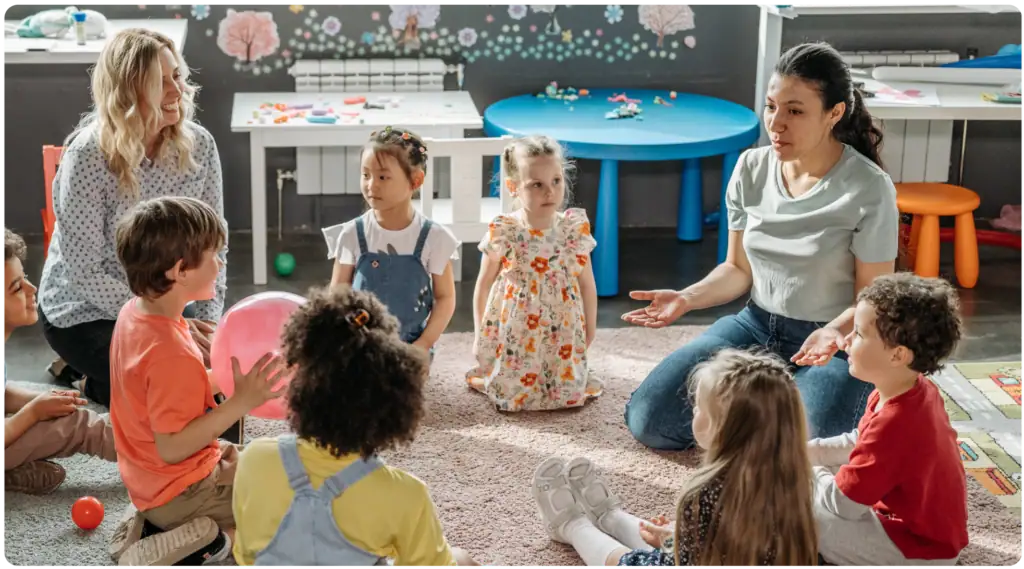Raising a child is no easy task, and many parents, especially young millennial moms and dads, face multiple adversities in their journey to provide the best care possible. From the overall shortage in childcare, to mental health challenges to financial struggles and community issues, these hardships can weigh heavily on families (1).
In times like these, it’s essential to remember that it “takes a village” to raise a child. This article will explore the idea of the village, how music can be a part of it, and how parents can lean on their community for support to navigate the challenges of childcare.
Create Your Village
The concept of the village comes from an African proverb, suggesting that it takes a community to raise a child. This means that not only parents but also siblings, extended family members, neighbors, teachers, professionals, community members, and policymakers play a crucial role in a child’s upbringing. These villagers contribute to a nurturing environment where children can grow, learn, and realize their dreams.
As a parent it’s important to lean into this concept and understand that you can’t do it alone – and you shouldn’t. Of course, you’re in charge, but it’s totally okay to get help (and ask for it) when you need it. Build a village around you and your family and your children’s well-being will be better.
Long-Distance Family Members
In today’s globalized world, it’s common for extended family members like grandparents, aunts, uncles, and siblings to live far away from the nuclear family. While they may not be a part of your local village, these long-distance relatives still play an essential role in the upbringing of a child. Here are some tips and ways to include them in your village and benefit from their support:
- Schedule regular video calls: Technology has made it easier than ever to stay connected with loved ones, no matter the distance. Schedule regular video calls with your extended family members using platforms like FaceTime, Skype, or Zoom, so they can be an active part of your child’s life. These virtual interactions can provide emotional support, advice, and a sense of belonging for both you and your child.
- Share updates and milestones: Keep your long-distance relatives informed about your child’s progress and achievements by sharing updates, photos, and videos through email, social media, or messaging apps. This helps maintain the connection between your child and their extended family members, even if they cannot be physically present.
- Plan vacations and visits: Whenever possible, plan vacations or visits that include your long-distance family members. Spending quality time together can strengthen bonds and create cherished memories. If traveling is not feasible, consider inviting your extended family to join you for special occasions, such as birthdays or holidays.
- Establish traditions: Create family traditions that involve your long-distance relatives, such as reading a bedtime story over video call, watching a movie together virtually, or exchanging letters and artwork. These shared activities can help your child feel connected to their extended family and provide a sense of continuity.
Related Reading: Daycare vs. Preschool in Los Angeles
The Role of Music in the Village
Music can be an essential part of the village, offering a creative outlet for both children and parents. Just like with an actual village, music is a bond that brings together each member within a village. It’s a universal language that helps us communicate when we might know know the words to speak.
Perhaps your child’s grandparents (your parents) speak a different language. That can make child-grandparent bonding difficult. That’s where music steps in and makes a huge difference.
Furthermore, studies have shown that engaging in musical activities can benefit cognitive, emotional, and social development in children (2). Music can be a source of bonding and stress relief for parents and children alike.
For example, a study by Gerry, Unrau, and Trainor (3) showed that participating in musical activities with infants improved the quality of parent-infant interactions, contributing to the child’s social and emotional development. Music can help parents (and others) navigate the challenges of childcare by creating a shared experience, which ultimately strengthens the entire village.
Creating a Supportive Village
To create a thriving village, we must move past traditional practice silos and adopt a more collaborative approach. By working together, villagers can help families in need by providing support, guidance, and resources. Here are some principles to consider for building a strong village:
- Foster communication: Open and honest communication is vital for creating trust and understanding among villagers. Encourage dialogue among family members, neighbors, and professionals to ensure everyone is on the same page.
- Emphasize inclusivity: Every family is unique, and it’s essential to recognize and respect their individual needs, values, and circumstances. Promote inclusivity by embracing diverse perspectives and approaches to childcare.
- Encourage community involvement: Get involved in local organizations, events, and initiatives that support families in need. By actively participating, you’ll strengthen the bonds within your community and create a more resilient village.
- Offer support and resources: Provide tangible support by offering resources, guidance, and assistance to families experiencing adversity. This can include sharing information on local services, organizing workshops, or offering a helping hand when needed.
You Got This!
The challenges of childcare can be daunting, but it’s important to remember that it takes a village to raise a child. By fostering a sense of community, embracing the power of music, and supporting one another, we can create a nurturing environment for children and their families. So, reach out, connect with others, and be part of the village that helps every child flourish.
(1) Maybery, D., Reupert, A., Goodyear, M., & Grant, A. (2019). It takes a village: Supporting families living with parental mental illness. Frontiers in Psychiatry, 10, 202.
(2) Hallam, S. (2010). The power of music: Its impact on the intellectual, social, and personal development of children and young people. International Journal of Music Education, 28(3), 269-289.
(3) Gerry, D., Unrau, A., & Trainor, L. J. (2012). Active music classes in infancy enhance musical, communicative, and social development. Developmental Science, 15(3), 398-407.





